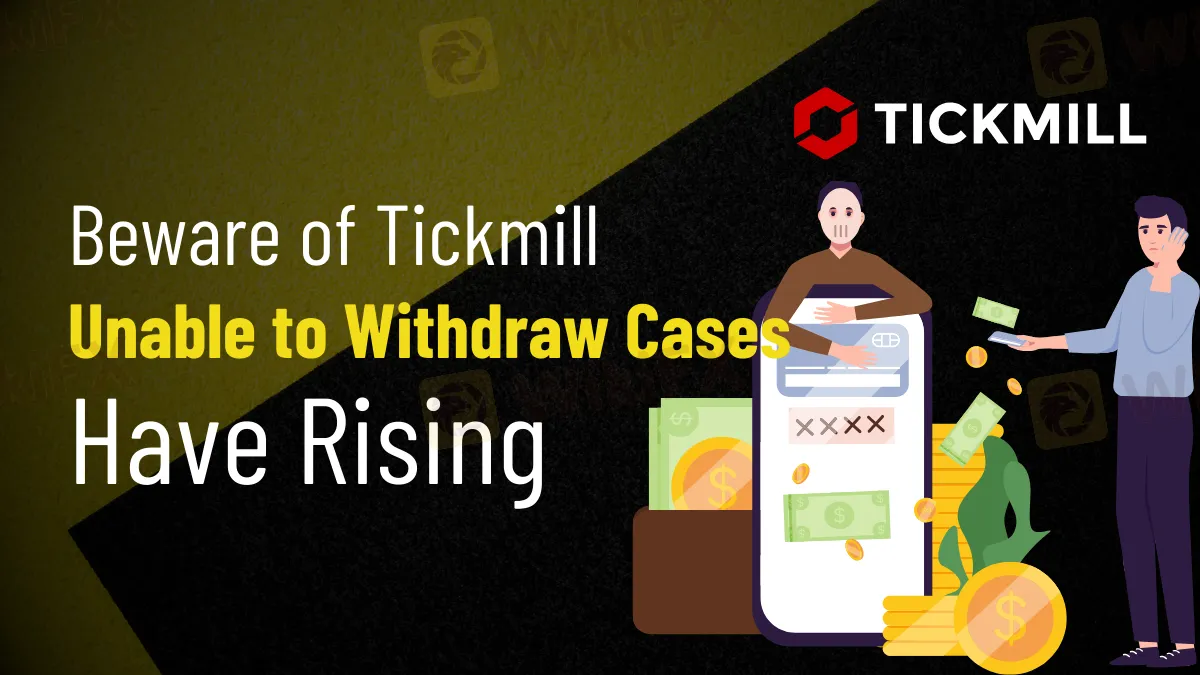简体中文
繁體中文
English
Pусский
日本語
ภาษาไทย
Tiếng Việt
Bahasa Indonesia
Español
हिन्दी
Filippiiniläinen
Français
Deutsch
Português
Türkçe
한국어
العربية
Beware of Tickmill, Unable to Withdraw Cases Have Rising
Abstract:Trader struggles with Tickmill, facing blocked withdrawals and demands for fees, highlighting concerns about the broker's reliability and ethics.

The WikiFX expose team has received 53 complaints about Tickmill, an online trading broker, up until this date. This is a concerning trend. Many people's most urgent issue is not being able to withdraw money, which raises questions about Tickmill's reliability and business procedures.

The account of a 35-year-old American trader serves as a clear illustration of the difficulties faced by Tickmill's customers. The person was first drawn into trading via an app discussion, but a promoter's endorsement of Tickmill's trading platform and services eventually won them over. With the expectation of having a profitable trading experience, these guarantees prompted people to deposit their money.
Soon after the trader finished registering and made their first deposit, their excitement turned to dissatisfaction. They encountered a masonry wall while attempting to extract their wealth. After Tickmill reported the account for potential money laundering, their withdrawal request was abruptly denied. In response to this accusation, Tickmill withheld their cash and sought identification documentation and a large payment of $4,000 to settle the disagreement.


The trader had doubts about agreeing with such requests, particularly considering their impeccable financial record, since they saw warning signs. The issue deteriorated when Tickmill set a rigid payment deadline, requiring the $4000 to be received by March 15th to unlock the account. This irrational demand validated the trader's suspicions that they were involved in a possible fraud.


In an attempt to exact revenge and alert others to the broker's questionable practices, the trader, determined to fight back, refused to pay the charge and reported Tickmill to WikiFX.
This experience brings to the attention of anyone considering trading with Tickmill a significant issue. The disruption of the trading process caused by the challenges associated with currency withdrawals also raises concerns regarding the broker's operational integrity and moral character. Before making investments on an online trading platform, people who want to become traders should be careful and do a lot of studying. This aspect holds specific significance for platforms such as Tickmill, which have frequently received reports of withdrawal issues.
You may access the exposure report here.
In summary, many customers have had negative experiences with Tickmill, particularly when attempting to withdraw money. When investing money in Tickmill, it's crucial to exercise caution and due diligence. It is evident from the many complaints about the inability to withdraw money that we should exercise caution while engaging in online trading.

Disclaimer:
The views in this article only represent the author's personal views, and do not constitute investment advice on this platform. This platform does not guarantee the accuracy, completeness and timeliness of the information in the article, and will not be liable for any loss caused by the use of or reliance on the information in the article.
Read more

The Hidden Checklist: Five Unconventional Steps to Vet Your Broker
Forex broker scams continue to evolve, employing new tactics to appear credible and mislead unsuspecting traders. Identifying these fraudulent schemes requires vigilance and strategies beyond the usual advice. Here are five effective methods to help traders assess the legitimacy of a forex broker and avoid potential pitfalls.

Doo Financial Obtains Licenses in BVI and Cayman Islands
Doo Financial, a subsidiary of Singapore-based Doo Group, has expanded its regulatory footprint by securing new offshore licenses from the British Virgin Islands Financial Services Commission (BVI FSC) and the Cayman Islands Monetary Authority (CIMA).

CFI’s New Initiative Aims to Promote Transparency in Trading
A new programme has been launched by CFI to address the growing need for transparency and awareness in online trading. Named “Trading Transparency+: Empowering Awareness and Clarity in Trading,” the initiative seeks to combat misinformation and equip individuals with resources to evaluate whether trading aligns with their financial goals and circumstances.

Malaysian-Thai Fraud Syndicate Dismantled, Millions in Losses Reported
The Royal Malaysia Police (PDRM) has received 26 reports concerning the Nicshare and CommonApps investment schemes, both linked to a major fraudulent syndicate led by a Malaysian citizen. The syndicate’s activities came to light following the arrest of its leader by Thai authorities on 16 December.
WikiFX Broker
Latest News
ASIC Sues Binance Australia Derivatives for Misclassifying Retail Clients
WikiFX Review: Is FxPro Reliable?
Malaysian-Thai Fraud Syndicate Dismantled, Millions in Losses Reported
Trading frauds topped the list of scams in India- Report Reveals
AIMS Broker Review
The Hidden Checklist: Five Unconventional Steps to Vet Your Broker
YAMARKETS' Jingle Bells Christmas Offer!
WikiFX Review: Something You Need to Know About Markets4you
Revolut Leads UK Neobanks in the Digital Banking Revolution
Fusion Markets: Safe Choice or Scam to Avoid?
Currency Calculator


